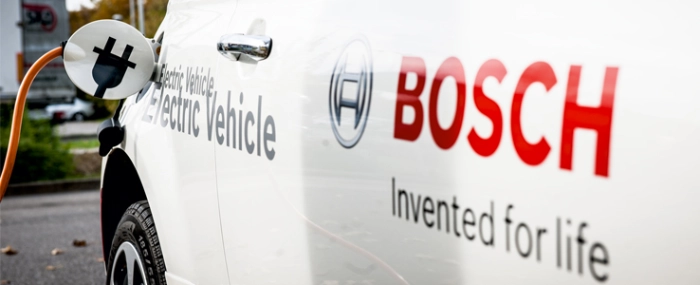
© Bosch
Electronics Production |
Bosch abandons battery strategy – opts for outsourcing
The company has previously said that it aims to lead the mass market for electromobility that will emerge after 2020. While that goal still holds true, the company is planning to reach it slightly differently than before.
In this endeavour, Bosch is relying on its systems expertise and the development and manufacture of key components of the electrical powertrain, such as the electric motor, power electronics, and battery systems.
The company will continue to buy in the cells needed to make these battery systems. For economic reasons, Bosch has decided not to set up cell manufacturing operations of its own. “For Bosch, it’s important to have a technical understanding of cells. We don’t have to make them ourselves,” Dr. Rolf Bulander, member of the board of management of Robert Bosch GmbH and chairman of the Mobility Solutions business sector, says in a press release.
The electromobility market is moving quickly and expanding with established automaker and new players entering the field. Bosch says that it is taking these dynamic market developments into account in its goal to make electric driving more viable and mass-marketable.
Bosch says it will continue to work with cell suppliers to design cells for hybrid- and electric-vehicle batteries, and buy these cells from them. For this reason, the company is disbanding its research into current and future cell technologies, whose brief was to assess the feasibility of in-house cell production. The Lithium Energy and Power GmbH & Co. KG (LEAP) joint venture (set up together with GS Yuasa International and Mitsubishi Corporation) for lithium-ion technology will be dissolved.
The company also plans to sell its Seeo subsidiary, which researches into solid-state technology. In a centre of competence, Bosch will continue to add to the battery-cell expertise it has built up over recent years. As was occasionally the case in the past, several hundred associates will continue to work on battery systems. They will develop battery-management systems and 48-volt battery systems, and draw up the specifications for cells.
“Even now, Bosch is capable of integrating individual components into complete systems. We make highly efficient 48-volt battery systems and develop attractive battery-management systems,” says Dr. Mathias Pillin, who is responsible for electromobility activities at Bosch.
Regardless of the decision that has now been made, Bosch sees huge potential in solid-state technology.
“Technically speaking, we’ve made excellent progress in our development work. Solid-state technology is the way forward,” Pillin adds. The decision to continue buying in cells in the future is the result of a lengthy economic assessment, in which it became clear that investing in the commercialization of cell technologies – whether improved existing technologies and future ones – is too risky.
For a competitive, market-relevant cell manufacturing operation, calculations showed that the initial investment alone would be some EUR 20 billion. This sum would allow the company to set up manufacturing capacity of approximately 200 gigawatt-hours, equivalent to a 20 percent market share, and a leading position in the market.
In addition to this initial investment, there would be operating costs running into billions, and three-quarters of the manufacturing cost would be cost of materials. This would therefore leave only a narrow scope for creating and exploiting competitive advantages. Given dynamic market, it is unclear whether if this investment would pay off for Bosch, and when. Which is why the company says such a risky investment cannot be justified.

